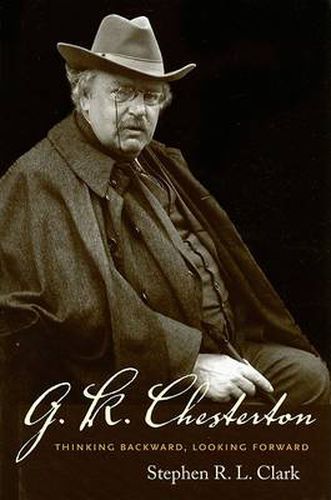Readings Newsletter
Become a Readings Member to make your shopping experience even easier.
Sign in or sign up for free!
You’re not far away from qualifying for FREE standard shipping within Australia
You’ve qualified for FREE standard shipping within Australia
The cart is loading…






G. K. Chesterton, early twentieth-century essayist, poet, novelist, political campaigner and theologian, philosophised greatly about society and the future. A study of his thinking and selected writings, with particular reference to his status as a precursor of the genre later known as science fiction, enriches our understanding of how we came to be where we are and how we can advocate a better future. In this book, Stephen R. L. Clark, a philosopher with a lifelong addiction to science fiction, explores Chesterton’s ideas and arguments in their historical context and evaluates them philosophically. He addresses Chesterton’s sense that the way things are is not how they must have been or need be in the future and his willingness to face up to the apparent effects of the nihilism he detected in the science and politics of his day. Clark offers a detailed study of some of Chesterton’s works that have been identified by science fiction writers and critics as seminal influences. He attempts to deal with some of Chesterton’s theories that have been found offensive or positively wicked by later writers and critics, including his arguments against female suffrage and in praise of war, his mediaevalist leanings and his contemptuous rejection of Darwinian evolutionary theory. Chesterton worked to remind us of the oddity, the wonder, of the world we live in, by pointing up and exaggerating too-familiar features of that world, comments Clark. It is not necessary to agree with him on every issue to find his work invigorating and enlightening. Chesterton’s approach to life and the world might be summarised as that of one who thinks backward or looks at the world upside down, acknowledging the often-arbitrary nature of our customs and beliefs and, also, the underlying virtues of humanity. A philosophical analysis of this view provides insight into our past and the future we can shape.
$9.00 standard shipping within Australia
FREE standard shipping within Australia for orders over $100.00
Express & International shipping calculated at checkout
G. K. Chesterton, early twentieth-century essayist, poet, novelist, political campaigner and theologian, philosophised greatly about society and the future. A study of his thinking and selected writings, with particular reference to his status as a precursor of the genre later known as science fiction, enriches our understanding of how we came to be where we are and how we can advocate a better future. In this book, Stephen R. L. Clark, a philosopher with a lifelong addiction to science fiction, explores Chesterton’s ideas and arguments in their historical context and evaluates them philosophically. He addresses Chesterton’s sense that the way things are is not how they must have been or need be in the future and his willingness to face up to the apparent effects of the nihilism he detected in the science and politics of his day. Clark offers a detailed study of some of Chesterton’s works that have been identified by science fiction writers and critics as seminal influences. He attempts to deal with some of Chesterton’s theories that have been found offensive or positively wicked by later writers and critics, including his arguments against female suffrage and in praise of war, his mediaevalist leanings and his contemptuous rejection of Darwinian evolutionary theory. Chesterton worked to remind us of the oddity, the wonder, of the world we live in, by pointing up and exaggerating too-familiar features of that world, comments Clark. It is not necessary to agree with him on every issue to find his work invigorating and enlightening. Chesterton’s approach to life and the world might be summarised as that of one who thinks backward or looks at the world upside down, acknowledging the often-arbitrary nature of our customs and beliefs and, also, the underlying virtues of humanity. A philosophical analysis of this view provides insight into our past and the future we can shape.